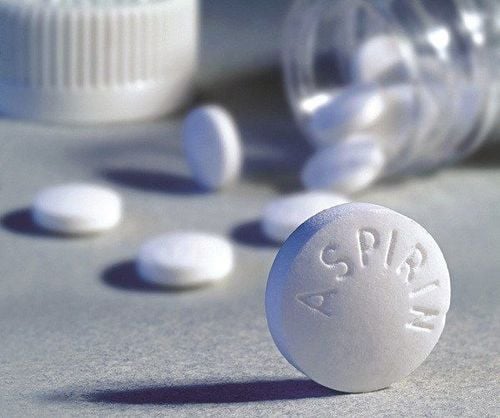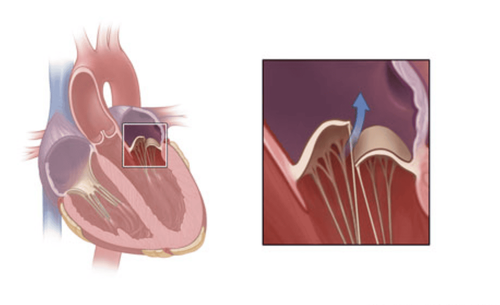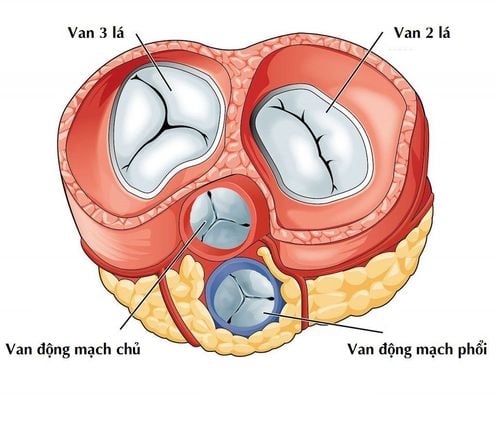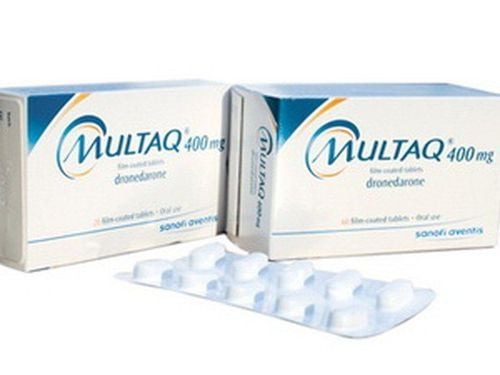This is an automatically translated article.
The article is professionally consulted by Master, Doctor Hoang Thi Hoa - Cardiologist - Department of Medical Examination and Internal Medicine - Vinmec Ha Long International General Hospital.Mitral valve prolapse is a common cardiovascular disease, although not directly life-threatening, but in many cases can lead to many complications affecting health.
1. Mechanism of action of the heart valve
The human heart consists of 4 chambers: 2 upper chambers called atria, and 2 lower chambers called ventricles. The chambers of the heart will be named after the right and left side: Right ventricle, left ventricle, right atrium, and left atrium. Between the atria and ventricles are two heart valves known as atrioventricular valves. The left atrioventricular valve is a mitral valve because it has 2 leaflets when closed, while the right atrioventricular valve has 3 leaves so it is called a tricuspid valve.In a normal human body, blood will go from the right ventricle into the lungs. After being supplemented with oxygen through the pulmonary valve, blood will pass through the aortic valve leaving the left ventricle to circulate to other parts of the body. Usually the right side of the heart has a lower pressure than the left side because the blood pressure in the lungs is very low. This means that the valves on the right will be easier to close in than on the left. Blood pressure is usually measured as the blood pressure in the left part of the heart.
The average heart beats more than 100,000 times a day. If the heart rhythm is abnormal, it is possible that one of the two heart valves is not closing tightly or is narrowed. The doctor, when using a stethoscope to listen to the heartbeat in these cases, will hear a heart murmur. Based on the intensity, location, and duration of the murmur, your doctor can tell which heart valve is having a problem.

Hình ảnh mô tả cơ chế hoạt động van tim
2. How is mitral valve prolapse?
When the left ventricle begins to contract to push blood to nourish the body, the mitral valve will normally close. The condition when the mitral valve thickens and bulges (prolapse) into the atria is called mitral valve prolapse.
3. Complications of mitral valve prolapse in the heart
Besides the common symptoms of mitral valve prolapse in the heart such as arrhythmia, chest pain, shortness of breath, dizziness, anxiety, etc., there may also appear some complications of valve prolapse. 2 leaves affect the patient's health. Specifically:
Arrhythmia This mitral valve prolapse complication is common in the upper chamber of the heart and is not life-threatening. The patient may be asked to do an electrocardiogram to check the severity of the leak in the heart valve, to prevent the disease from getting worse. At a more severe level, arrhythmias occur in both the upper and lower chambers, especially the lower chamber heart rhythm abnormalities that can be life-threatening.
Endocarditis When the heart valve malfunctions and leaks, it can lead to chaotic bleeding and damage to the left heart valve surface. This increases the risk of endocarditis (also known as an infection of the heart valves). This condition can be prevented by taking antibiotics prescribed by your doctor before dental and medical procedures. Recently, however, only people at high risk of endocarditis have been prescribed antibiotics.
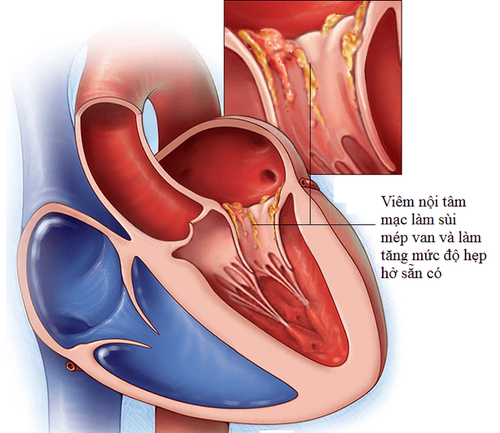
Viêm nội tâm mạc
Heart valve regurgitation This is the most common complication in patients with mitral valve prolapse. Men, especially those 50 years of age or older with high blood pressure, have a greater risk of valvular reflux. Open heart surgery may be indicated if the condition worsens or becomes symptomatic.
If complications of valvular regurgitation in patients develop seriously, it is necessary to consider choosing a reputable cardiovascular center to be examined and consulted about conducting surgery. If the heart valve is repairable, then surgical repair of the heart valve should be done instead of replacing it with an artificial heart valve.
4. Advice for people with mitral valve prolapse
For patients diagnosed with mitral valve prolapse, maintaining appropriate lifestyle habits will help limit the progression of the disease and prevent potentially dangerous complications. as mentioned above.
Periodic follow-up to monitor health status and progression of symptoms. Use the medicine according to the doctor's instructions, do not arbitrarily quit prescribed drugs or arbitrarily take over-the-counter drugs. Exercise at a gentle, moderate intensity. Have a reasonable weight loss diet, you can consult a doctor or nutritionist about a scientific diet.

Định kỳ kiểm tra sức khỏe, giúp mọi người phát hiện bệnh tim mạch sớm
Mitral valve prolapse, although in the heart is a disease that is not too dangerous, but without proper treatment, it can lead to dangerous complications of mitral valve prolapse. Therefore, people with mitral valve prolapse should closely monitor their symptoms and notify the doctor immediately if necessary for timely intervention.
To protect heart health in general and detect early signs of myocardial infarction and stroke, customers can sign up for Cardiovascular Screening Package - Basic Cardiovascular Examination of Vinmec International General Hospital . The examination package helps to detect cardiovascular problems at the earliest through tests and modern imaging methods. The package is for all ages, genders and is especially essential for people with risk factors for cardiovascular disease.
Master. Hoang Thi Hoa has more than 10 years of experience in the field of Cardiology, especially in the field of cardiovascular emergency and echocardiography. Doctor Hoa used to be the Deputy Head of Cardiology Department of Quang Ninh General Hospital before working at Vinmec Ha Long International Hospital.
If you notice unusual health problems, you should visit and consult with a specialist.
MORE
Mitral valve disease Treatment of tricuspid valve disease through minimally invasive open heart surgery with laparoscopic support Repair and replace mitral valve through minimally invasive open heart surgery
Please dial HOTLINE for more information or register for an appointment HERE. Download MyVinmec app to make appointments faster and to manage your bookings easily.




